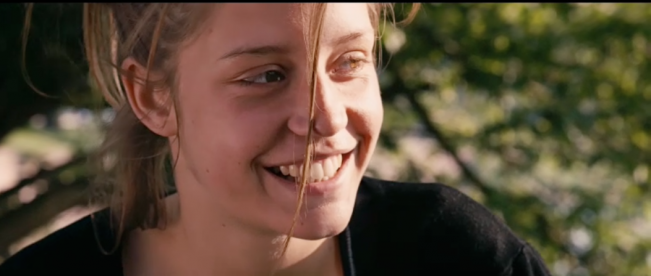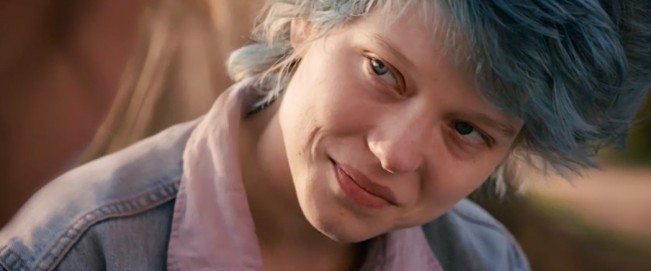By Jake Howell jake.howell@utoronto.ca
Palme d’Or Winner Review: La Vie d’Adèle (Blue is the Warmest Color)
 Blue is the Warmest Color is a staggering motion picture, so big and so important and so full of life. It represents a milestone in on-screen sexuality, putting another nail in the coffin of old-world ignorance and prudishness, but it’s also a cinematic achievement in acting. In short, it’s a true opus.
Blue is the Warmest Color is a staggering motion picture, so big and so important and so full of life. It represents a milestone in on-screen sexuality, putting another nail in the coffin of old-world ignorance and prudishness, but it’s also a cinematic achievement in acting. In short, it’s a true opus.
Abdel Kechiche’s three-hour film adapts Julie Maroh’s award-winning French graphic novel of the same name. (The filim premiered at Cannes 2013 under its French title, La Vie d’Adèle – Chapitre 1 & 2). There’s been debate on the film’s different titles, and while the English title, Blue is the Warmest Color works better both in terms of marketing and staying true to Maroh’s original title (Bleu est une couleur chaude), La Vie d’Adèle is a decidedly appropriate title. Spanning the course of a number of years, the film depicts Adèle (Adèle Exarchopoulos—remember her name) and her journey through a sexual awakening, beginning in high school and continuing as she matures into a fully-functioning adult. More than that, though, this is a film about life itself: eating, talking, drinking, kissing, laughing, loving, smoking, crying—each of these actions are highlighted through intense close-ups and Kechiche’s adherence to realism. The film has an oral fixation in a number of ways, but the idea here is that life is lived through the mouth, via communication, consumption, and sexual expression.
 The saga that is Blue is the Warmest Color begins when Adèle hooks up with an eager garçon from her class, and Adèle is depressed by the experience and embarrassed from the ensuing gossip storm. Her assumed heterosexuality is rocked when a girlfriend kisses her for fun; further shaking her identity is a blue-haired enigma (Léa Seydoux) who passes Adèle on the street. They eventually meet (her name is Emma, we learn) and they share a tender moment of flirtation, culminating later in the first of many sex scenes. With the set-up complete, the film’s remaining two hours depicts the trajectory of their relationship, with the orgasmic ups and the tumultuous downs that accompany any blooming love.
The saga that is Blue is the Warmest Color begins when Adèle hooks up with an eager garçon from her class, and Adèle is depressed by the experience and embarrassed from the ensuing gossip storm. Her assumed heterosexuality is rocked when a girlfriend kisses her for fun; further shaking her identity is a blue-haired enigma (Léa Seydoux) who passes Adèle on the street. They eventually meet (her name is Emma, we learn) and they share a tender moment of flirtation, culminating later in the first of many sex scenes. With the set-up complete, the film’s remaining two hours depicts the trajectory of their relationship, with the orgasmic ups and the tumultuous downs that accompany any blooming love.
The much-discussed lesbian sex scenes—which are long, graphic, and apparently unsimulated—will be a sticking point for some viewers, but those who have a problem with these extended moments of groping and tribadism may be missing the point (and to be sure, the problem exists within them, not the film). Make no mistake: Kechiche is not fetishizing the naked bodies of Seydoux and Exarchopoulos, nor is he obsessed with lesbian sexuality. The sex in Julie Maroh’s original graphic novel is laid bare, and Kechiche has translated it the screen with no punches pulled.
Are these marathon sex scenes justified? Unequivocally yes. Adèle’s fight to understand her sexuality is just one story in a society that prefers men and women being together, and offended audience members (especially those who enjoy the privileges of heteronormativity) can and should sit through these scenes with sensitive patience. The explicit sex is shown at length as a payoff for the characters, not the audience; they are included to counterbalance the trials homosexual couples must go through just to receive the same pleasures hetero couples are inherently entitled to. In other words, dismissing these scenes as “indulgent” or “pornographic” is wholly unfair. These scenes are a critical element in the film, and removing them would lessen the overall impact of their romance (especially when straight sex scenes are a dime a dozen).
The true revelation of Cannes 2013 is Adèle Exarchopoulos, who is, in no uncertain terms, astounding. There has been a diversity of strong female performances at this year’s event, but then there is Exarchopolous, whose emotional range sets the bar for uplifting highs and heartwrenching lows. She has given everything to her director Kechiche, who in turn has given everything back to her. Seydoux is also marvelous, and it should be made clear that she is not a footnote to Exarchopoulos but an equal. If you thought Paul Thomas Anderson’s The Master was led by powerhouse male performances, La Vie d’Adèle invites you to reassess your definition of incredible two-handed acting. (An especially moving scene near the two-hour mark had audience members in tears.)
Cannes festivalgoers were subjected to a film that was so fresh that it likely came out of the editing bay only days before it played the Croisette. This is clear because there weren’t any opening credits; the closing credits were equally minimal. Indeed, early word on the film was that Kechiche was still toying with the picture’s length close to the premiere date. If the film is edited post-Cannes, we can only hope it is tempered very little. La Vie d’Adèle is an astonishing film, its three-hour run-time flying past as it captures a universal human experience despite sexuality atypical for epic screen treatment. It’s not often a romance drama weighs as much as a Lord of the Rings installment, but when duration is used effectively—if there is a reason to go deeper emotionally and narratively than most stories can afford—Kechiche proves the result can be a masterpiece.
















The North American writer of this piece, clearly reveals the typical American sexual repressive society. From what I have read about this film, it seems to be a poignant representation of two women deeply in love. Nothing exists, which is more sensual, spiritual and erotic than two women becoming one through thier sexual experience. Two women experiencing an obvious passion as seems to be depicted in the film, is both pure, natural and the ultimate in sensuality. If truly, more men could get it, (the sensuality) then the women would experience a sexual fulfillment such as when they experience the ultimste in passion (with anothr woman) and are carried away on an out of body experience immersed in a sea of passion. From the reviews I have read, this film is about love, sensuality and passion, not about sex.
I’ll be interested to see if the film has the merits claimed, which seems to me will not rest on the sex scenes. People that react to sex scenes, either celebrating it or abhoring it, are both represeed in their own way. The things mentioned in this review (“eating, talking, drinking”…) are all mundane but can of course be sensually aesthetic if filmed well. But sex and sexual awakening can be equally mundane, whether hetero or homosexual or auto-erotic. Seriously, there is nothing different about a gay person’s sexual explorations than a straight person’s. The comment by James above show his own repression, claiming that women with women is somehow more sensual than other sexual couplings. I’m a libertine and can honestly say, after having tried all combinations, that while sex can be sensually thrilling, it can also be mundane, gross, selfish and even destructive. But who cares? People interested in watching others have sex are those that are unsatisfied in their own sex life. Get over it. The author of this review is obviously seriously repressed and I suspect the director is just being lazy — just pushing a limit to get attention — but I hope the movie had more merit and look forward to seeing it.